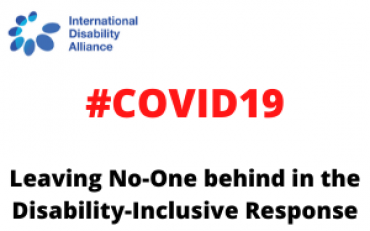This is one story as part of the Voices of People with Disabilities during COVID19 Outbreak series.
Names have been changed to protect the individuals mentioned in the story.
“I don’t have any information on how to prevent contagion from COVID-19. No one told me for instance that I have to sanitize my cane, I have to rely on my own common sense and knowledge. Plus, I don’t have a sanitizer nor masks”, says Akinyi.
Akinyi is a 36-years old blind woman from Kenya. She is a trained teacher on disability rights and inclusion of persons with disabilities. “I rely on going out and earning a living as a trainer but for that, I need to be outdoors. The little I savings I had have run out and now I rely on friends to obtain food.”, she says.
“As a blind person, I have to touch surfaces to move about and use my hands a lot. Social distancing is another barrier for me, as I often have to have a guide at close range.” Akinyi is worried about the lack of tools and resources people with disabilities have to deal with COVID-19. She says that the government and DPOs should maintain the human rights approach to disability and step away from archaic disability models, where people might feel forced to beg or depend on charity.
Accessibility of information on COVID-19
“Information regarding COVID-19 is hard to access as a blind person. I’m a braille user and information are not reaching the blind community. I need someone who is sighted to read out the news to me”, says Akinyi. Information in accessible formats is not available in general. Akinyi relies on WhatsApp and Facebook to stay up to date on the latest news, however, connection and data is not always available. “On TV they ask to call the number displayed on the screen if you think you are experiencing COVID-19 symptoms and of course, I can’t see what it is. Information is incomplete”, says Akinyi. Owning a TV is uncommon, most people with disabilities cannot afford it, therefore, radio station channels have become the main means of obtaining information for visually impaired persons.
Unfortunately, braille users do not have access to documents in accessible format nor braille. “Those who don’t use braille should get information on their emails, or social media, using accessible PDFs or word documents. Information should be adapted to us”, she says. Blind people often rely on screen reader software and some digital formats often used are not accessible, including scanned documents, images of a text, infographics or diagrams with no alternative text.
Food shortages
A recurrent issue is food shortages and starvation. “We must ensure that no one of us is stripped off their dignity as a human person because of this pandemic. We cannot allow a population’s dignity to be reduced to begging and praying that they get their next meal, that they may find a well-wisher to give them a few shillings for their next meal”, says Akinyi. She believes that the government at the local level must intentionally find organizations of persons with disabilities to work with at this very crucial point. Also, organizations of persons with disabilities must proactively seek to work with the government.
Akinyi does not receive any type of financial support from the state, as they are reserved for the “severely disabled”, as authorities claim. Persons with disabilities call for more action to be taken from the government’s side to ensure persons with disabilities are treated with dignity and equality.

